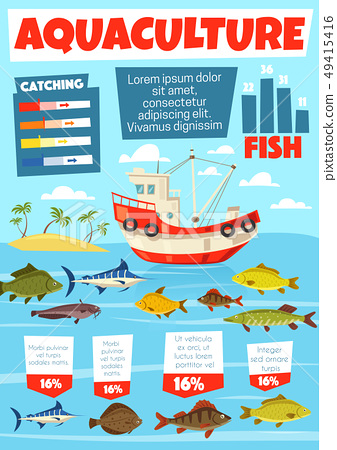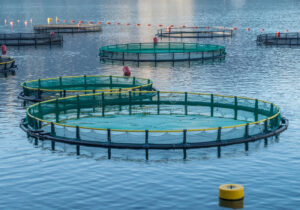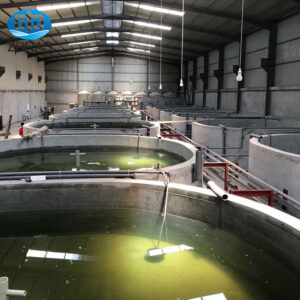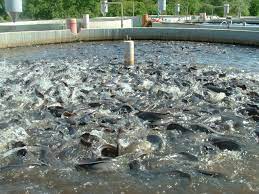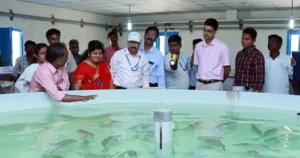Aquaculture also known as “Underwater Agriculture” involves the breeding and rearing of fishes and mollusks for commercial usage I,e. For consumption as well as displaying in aquariums. Aquaculturist is a person who pursue aquaculture as career.
Aquaculture is generally carried out in reserved areas like confined tanks or at open sea under monitoring, and is referred to as Mariculture.
Today Aquaculture is an encompassing and wide arena where you can kickstart your career. The only thing that you require to take it as your career is an interest in the subject and in general agriculture.
What is Aquaculture and Fisheries?
The term Aquaculture and Fisheries involves catching of inland and marine fishes for commercial purposes. They both involve aquaculture,gears,navigation, oceanography,aquarium management,breeding,processing,export and import of seafood, special products and by-products, research and related activities.
Whereas Fisheries is the occupation of catching, processing or selling fish or shellfish, Aquaculture is the cultivation of aquatic animals and plants, especially fish, shellfish and seaweed, in natural or controlled marine or freshwater environments.
Aquaculture is the farming of the fish, crustaceans, Mollusca, aquatic plants, algae and other organisms. It involves the cultivation of saltwater and fresh water under controlled conditions.
Types of Aquacultures
Aquaculture can be classified into three categories;
- Freshwater Aquaculture
- Brackish Water Aquaculture
- Mariculture
1. Freshwater Aquaculture
The freshwater aquaculture mainly deals with the culture in fresh water like rivers, streams, ponds, and canals. It includes the various aspects of breeding the parent stock, preparing the water resources for culture,stocking,water management, post stocking management process and harvesting. The types of organisms include fishes,prawns,mussels,frogs and aquatic plants.
2. Brackish Aquaculture
Brackish aquaculture production in the country mainly accounts for shrimp farming. Of the estimated 1.23 million hectares of area recognized for aquaculture, only 10% is cultivated.
Of this, 80% of the area is under traditional farming while 20% is under shrimp farming. Shrimp farming is done in a commercial way mainly in the states of Andhra Pradesh and Tamil Nadu while traditional farming is done in West Bengal.
3. Mariculture
Marine aquaculture is the culture of fishes and other organisms in marine backwaters, shallow bays in several aquaculture methods. Mariculture is done mainly in the states of Kerala and Karnataka.
What is the Job Profile of an Aquaculturist?
An Aquaculturists conduct research in areas such as fish nutrition, water quality, aquaculture engineering, fish genetics, hatchery production and fish pathology. Most of them work in private laboratories or government agencies or government agencies.
Here is the job profile of an AquaCulturist.
- Reviewing aquaculture reports written by contractors.
- Record maintenance on fish health, fish inventories, ponds and fish movements to and from the station.
- Maintaining protocols on chemical safety.
- Identifying operational farming needs.
- Maintenance of all ponds and aquaculture systems, water supply, electrical systems, equipment,buildings etc.
- Taking appropriate and adequate measures to prevent fish losses.
- Providing strategies to optimize production procedures.
- Production daily reports on the running of the farm.
- Providing leadership and expert advice on the topic.
Advantages of Aquaculture
- Aquaculture is an important source of excellent quality protein and healthy oils.
- It keeps the future of fish production safe.
- It maintains the price and supply of the fish so as to reach it to poor section of the people.
- It provides good quality of food for the growing population.
- It produces cultured fishes which are free from pollutants and are thus safe.
- It helps to create more employment and help rural development.
- Commercial aquaculture helps in cultivating ornamental fishes, Artemia cysts, Prawns, Lobsters, prawns, crabs, and frog legs. These are highly valued items and can earn good foreign exchange.
How to start a career in Aquaculture?

Like any other job profile, you require a certain set of skills that can be attained to start a career in aquaculture. Here are a few of the skills that you must possess to be one.
Skills required to become an Aquaculturist
1. Technical & Practice Skills
As an aquaculturist you must be able to understand, measure, and measure various situations and be able to apply technical knowledge. You must be open to further training to improve your daily performance and skills.
2. Analytical Skills
You must be able to collect and analyze information in a methodical way as an aquaculturist.
3. Communication skills
As an aquaculturist you must be able to balance listening and talking. You must be able to speak and write clearly and accurately.
4. Self-Management
The art of self-managing is a very important skill you must possess as an aqua-culturist. You must be able to focus on effective planning and time management as well as prioritisation of tasks.
Courses and Programmes to become an Aquaculturist
To become an aquaculturist there are various undergraduate and postgraduate courses available in the field of Fisheries and Aquaculture. Since the Fisheries science is a science degree, you must complete your 12th in science stream along with biology.
The selection process for admission in fisheries and aquaculture institutes is either through university level examination (CUSAT 2022) or through state level exam. Students can also apply for ICAR 2022 to pursue this course.
Bachelor’s courses
- Bachelor of Fisheries Science(B.F.Sc) — 4 Years
- Bachelor of Science (Industrial Fish and Fisheries) — 3 years
- B.Sc. (Fisheries) — 3 years
- B.Sc. (Aquaculture) — 3 Years
Master’s Courses
- Master’s of Fisheries Science(M.F.Sc)– 2 Years
- Master’s of Science(M.Sc) — 2 Years
You can study aquaculture on a part time or full-time basis. Aquaculture courses can be a degree or a diploma program.
Top Aquaculture Institutes in India
Since there are a number of institutes and universities in India that offer courses in aquaculture it is in your best interest to go to a top-quality institute that is government recognized. Here are few of the top institutes/Universities where you can start you program .
- Dr Balasaheb Sawant Konkan Vidyapeeth, Ratnagiri, Maharashtra
- Kerala University of Fisheries and Ocean Studies, Panangrad, Kochi, Kerala, Ernakulam
- Govind Ballabh Pant University of Agriculture and Technology, Pant Nagar, Uttarakhand
- Central Institute of Fisheries Education, Mumbai, Maharashtra.
- Iihmr University, Jaipur, Rajasthan
- Junagadh Agriculture University, Junagadh.
- Maharana Pratap University of Agriculture and Technology, Udaipur, Rajasthan.
- Sher-E-Kashmir University of Agriculture Sciences and Technology of Kashmir. Srinagar, Jammu & Kashmir.
- Karnataka Veterinary Animal and Fisheries Sciences University, Bidar, Karnataka.
Career Scope in Aquaculture?
Aquaculture is one of the fastest growing sectors in the world. India has a vast coastal area which offers immense opportunities for fisheries in both marine and inland waters.
India has the second largest share in the global aquaculture market with its 2.36 million hectares of ponds and tanks, a coastline of 7,500 kms and brackish water of 1.1 million, which offers a ground of fish farming.
The fishing sector in India contributes livelihood to more than 28 million people in the country. With 10.5 lakh tons in volume and 33,442 crores in value, fish and fish products have risen to become the largest group of agricultural exports from India.
The share of the fisheries sector in the total GDP (at current prices) has increased from 0.40% in 1950-51 to 1.03% in 2017-18. It is a record increase of 157%. The sector contributed Rs 1,75,573 crore to the GDP (at current prices) during FY 2017-18.
The fisheries sector has demonstrated an outstanding double-digit growth of 10.87% since 2014-15.
The sector has reached record fish production of 142 lakh tons in FY 2019-20 and has immense potential for growth.
No doubt the fisheries sector has been recognized as the sunrise sector in India.
This provides a lot of career opportunities in fisheries and aquaculture.
Business and Career Opportunities
The Indian fisheries sector has tremendous opportunity for business and has contributed immensely as an employment generating sector. The Indian seafood business is expanding at a rate of approximately 15% per year. It still has a lot of room for growth. The increase in personal disposable income and changing consumption habit has increased the potential for entrepreneurs who wish to create their own fisheries or aquaculture firm.
Similarly, there are numerous careers or jobs after B.Sc. aquaculture in government and the private sector. The government has fisheries departments in all states in the country where one can apply for various posts. You can apply for jobs in various central government agencies like Marine Product Export Development Authority (MPEDA), Fisheries Survey of India (FSI), NIO, WHO, and many others.
Degree holders can apply for research projects or can-do further study. Candidates can find the number of job opportunities in fisheries and aquaculture in institutions,banks,fishing/oceans and in foreign countries.
Few of the top companies where the degree holders can apply are
- Mowi
- Trident seafood corporation
- Avanti Feeds
- Coastal Corporation Ltd.
- The Waterbase Ltd.
- Charoen Pokphand Food (CP Foods)
- Pacific Andes
Type of Jobs in Aquaculture Industry
Aquaculture has a vast scope and opting it as a career is a unique choice. It just requires from you an interest in the subject.
Fish farming ranges from a basic technician job to that of managers and bio-technologists and other applied sciences professionals.
Here are a few high paying jobs in Aquaculture.
-
Aquaculture Technician
An aquaculture technician is responsible for manning the areas where the fishes and molluscs are bred. An Aquaculture technician job is to ensure that the water is clean, adequate and the food for fishes is in regular supply.
-
Aquaculture Manager
Managerial Personnel is a person who is working in the fish farm as a manager. His role is to oversee the production, distribution, and sales aspects of the fishes bred at the farm. He is also responsible for the maintenance of the fish farm and necessary records.
-
Aquaculture specialist
An aquaculture specialist’s responsibility is to conduct operations at aquaculture farms and fisheries. These analysis results are then sent to the interested parties in both the public and private sector.
-
Aquarist
An aquarist is responsible for the well-being of fish and marine animals in an aquarium. He looks after the feeding of the fish, performs daily health checkups of fishes and monitors the activities of the organisms in the aquarium. He also tends the environment in the aquarium, and oversees the tasks of cleaning tanks, cleaning water recirculation pumps and maintaining pumps and maintaining required tools and equipment.
-
Seafood Inspector
The Seafood Inspector verifies the operations and end products in the aquatic farm to ensure that they are acceptable for human consumption, examines the procedures, species health and the working conditions in compliance to the standard laid down by the concerned authorities.
The Future
The Indian aquaculture industry has grown at a dramatic pace in the last two decades. Its size has increased sixfold, although it still has to overcome several infrastructural and technological bottlenecks. India is undergoing a Blue Revolution in the last two decades which has increased the employment opportunity in the fishing industry.
The Food and Agricultural Organization (FAO) reveals that 90% of the global reserves have been fully exploited. India uses only 40% of the available ponds, tanks, and other water bodies for freshwater aquaculture and 15% of total potential of brackish water resources.
India’s long coastline is its main strength to meet its objectives of Blue Revolution. It has reached new horizons in the advancement of technology. The government is aiming to turn India into a hotspot in fish production and is taking appropriate policies, marketing and infrastructure support. The industry has been transformed with innovative solutions which presents a great opportunity to invest their resources in a sector with immense growth potential. With these technological advancement and favourable government policies toward the industry, the aquaculture industry is going for a major boost making this sector as popular as the agriculture sector with even greater profitability.
.
